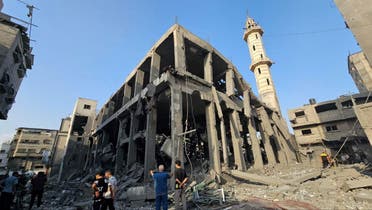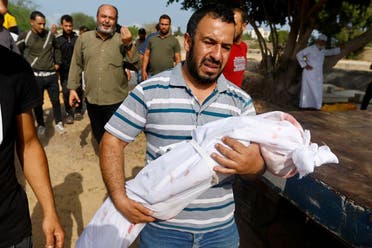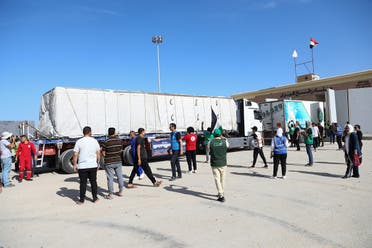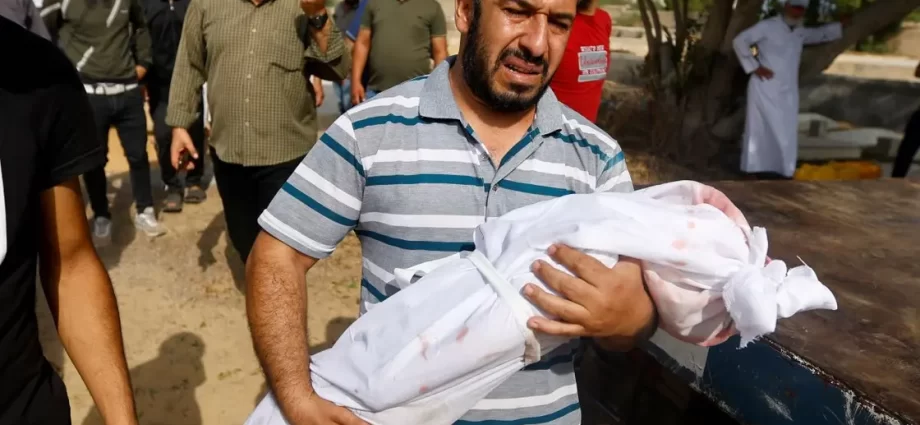GAZA ( Web News )
Israeli warplanes bombarded areas near three hospitals in the Gaza Strip early on Monday, Palestinian media reported, but it was not immediately clear whether the hospitals themselves suffered damage.
There was no immediate comment from the Israeli military on the reports, which said Israel had struck near Gaza City’s Shifa and Al-Quds hospitals and near the Indonesian Hospital, in the enclave’s north.
The director of the Indonesian Hospital told Al Jazeera the Israeli bombardment caused “serious damage and injuries,” without providing details.
Reuters was not immediately able to confirm the reports. There were no immediate reports of damage or injuries at or near the other two hospitals.
The Palestinian Red Crescent Society said on Oct. 14 that Israel had ordered them to evacuate Al-Quds hospital. The group said it was not possible to move the sick and wounded.
Unprecedented Israeli raids across Gaza continue
As Israeli violence on the Gaza Strip entered its third week, Israel launched dozens of air strikes across the besieged city in the early hours of Monday, Al Arabiya reported citing the Palestinian prime minister.
Hamas officials said Israeli strikes on Gaza overnight and early Monday killed at least 70 people, as the military said it had struck some 320 targets in the Palestinian enclave in 24 hours.
The Hamas-controlled government media office in the blockaded Gaza Strip said in a statement that “more than 60 were martyred in the (Israeli) raids” during the night including 17 who were killed in a single strike that hit a house in Jabaliya, in northern Gaza.
Israel bombarded residential areas in Gaza, including the densely populated Jabalia refugee camp and Beit Lahia in the north, the al-Rimal neighborhood, the Al Shati camp in the west, as well as Khan Yunis and Rafah in the south, the Palestinian News Agency (WAFA) reported.
At least 10 people were killed in new strikes on Monday morning, the media office said in a separate statement, bringing to overall toll since Sunday night to at least 70 deaths.
The Israeli military said Monday it had hit “over 320 military targets in the Gaza Strip” over the past 24 hours.
For more than two weeks, Israel has pummeled the territory with air strikes, following a cross-border attack launched by the armed group on October 7.
The bombing campaign has killed more than 4,650 Palestinians, including at least 1,873 children, according to Gaza’s health ministry.
Between 200 and 300 people have been killed each day in the besieged territory, according to government tolls.
Amid the campaign, tens of thousands of Israeli troops are gathered along the enclave’s borders for a widely anticipated ground invasion.
The military said Sunday that one soldier was killed and three others wounded during a tank operation inside Gaza.
Israel has warned more than one million residents in northern Gaza to move south for their safety, and the United Nations says more than half of the territory’s 2.4-million population is now displaced.
Hundreds of thousands of civilians are believed to remain in and around Gaza City in the north, unwilling or unable to leave.
The overnight Israeli bombings have further exacerbated the catastrophic humanitarian situation in Gaza, where its residents have been left with dwindling food and medical supplies.

On Sunday, the United Nations warned that the lives of at least 120 newborn babies on incubators were at risk as hospitals are on the verge of running out of fuel due to Israel’s complete siege.

Hospitals face a dire lack of medicines, fuel and water not only for the thousands wounded in more than two weeks of the war but also for routine patients.
“We have currently 120 neonates who are in incubators, out of which we have 70 neonates with mechanical ventilation, and of course this is where we are extremely concerned,” said UNICEF spokesman Jonathan Crickx.
Power is one of the main worries for the seven specialist wards across Gaza treating premature babies to help with breathing and provide critical support, for example when their organs are not developed enough.
Amid widespread electricity cuts, the World Health Organization warned on Thursday that hospitals had already run out of fuel for generators.
The WHO said that about 1,000 people needing dialysis will also be at risk if the generators stop.
Twenty aid trucks crossed from Egypt into Gaza on Saturday but there was no fuel in the consignment.

The UN humanitarian agency said the 20 trucks that entered Saturday amounted to only 4 percent of an average day’s imports before the war and “a fraction of what is needed after 13 days of complete siege.”
The Israeli military said the humanitarian situation was “under control,” even as the UN called for 100 trucks a day to enter.

